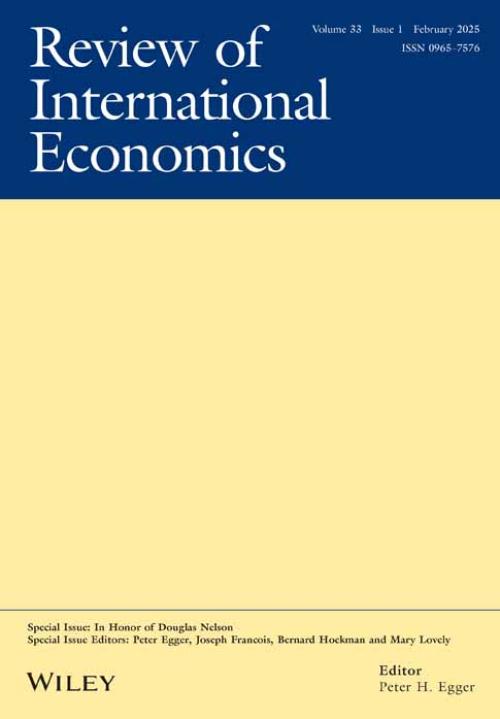Celebrating the research career of Douglas Nelson
Douglas Nelson, Professor of Economics at Tulane and Murphy Institute faculty, was honored in the January 2025 special issue of the Review of International Economics. Over a span of more than 40 years, Professor Nelson has made significant contributions to the fields of international economics and international economic policy. This special issue celebrates his body of research and includes articles by many of his co-authors, colleagues and students, reflecting a strong network of collaborators Professor Nelson has developed over the span of his career: Carl Davidson; Peter Egger; Joseph Francois; Tom Gressik; Bernard Hoekman; Udo Kreikemeier; Mary Lovely; and Steve Matuz.
In his research, Nelson has explored several important intersection points between economic policy and political processes. The result has been a rich set of insights on the role economic and political factors play within this domain, including trade policy, migration, contingent protection, and the impact of globalization on labor markets.
Drafts of the papers that make up the special issue were presented at a workshop held at the Robert Schuman Centre of the European University Institute in June 2023 and subsequently reviewed and revised. They span two broad themes. The first is the interplay between trade and investment flows and labor employment and equity. The second is the interaction between trade-related policies and patterns of trade and investment.

Turning to the first theme, Davidson and Matusz examine linkages between employment and intergenerational equity. Working with a trade-related example, they demonstrate differences in policy preferences for current and future generations. Continuing with a focus on labor markets, Egger, Egger, and Nelson focus on the role of corporate governance in determining the out-come of wage bargaining between workers and managers. They show that distributional conflicts materializing from trade can vary considerably for countries with differing corporate governance regimes. Egger, Kreickemeier, and Wrona examine linkages between minimum wage policy and offshoring. They find that appropriately designed minimum wage policies can serve to eliminate the incentive for offshoring, and correct labor market distortions following from monopsony in labor markets. Finally, Bekkers, Francois, Nelson, and Rojas-Romagosa focus on the importance of considering income distribution when specifying the objective functions of governments when formulating trade policy. Working with a quantitative trade model, they introduce a comprehensive tariff-space grid search that is new to the literature. They show that including income inequality as a determinant of social welfare—a primary focus of the early literature on trade wars— can substantially change noncooperative Nash outcomes. This is issue is largely ignored in the more recent trade war literature.
The other articles focus on the effects of regulation on trade and investment patterns for both goods and services. Garcés and Vogt develop measures of regulatory heterogeneity for trade in goods, drawing distinctions between the intensity, coverage, and structure of regulations. Working with detailed product-level regulatory data based on coded reviews of national legislation, they quantify these three dimensions of regulatory heterogeneity at the country- and sector-level. Their findings motivate a separate treatment of alternative heterogeneity dimensions in the assessment of non-tariff measures in international trade. Liang, Lovely, and Zhang investigate the extent to which China’s foreign ownership liberalization contributed to observed trends in subsequent foreign investment flows and Chinese exports. They find that removal of foreign equity caps induced entry of wholly foreign owned firms, while having no significant effect on entry of new joint ventures. Concurrently, the designation of new activities for investment incentives induced foreign entry, particularly in the form of joint ventures.
Hoekman, Santi, and Shingal focus on trade policy during the COVID-19 crisis. They find significant heterogeneity in the relationships between trade policy actions taken in 2020 and country characteristics. The likelihood of import liberalization was more prevalent among net exporters of medical products, whereas net importers were more inclined to impose export restrictions. Rose now quantifies the relative importance and the heterogeneous effects of regulations for Colombian firms exporting to Latin America between 2007 and 2017. He finds that technical barriers to trade (TBTs) and quantity control measures both decreased trade on average over the sample period. They also reallocated trade from small to big firms. Finally, Gresik examines the impact of destination-based taxation on foreign investment. Policies that lead to either efficient public good provision or to weak over-provision can both emerge as equilibrium properties under tax competition.
The last two articles examine the impact of regulation and (dis-)integration on services trade and cross-border data flows. Davies and Specht examine the impact of BREXIT on trade in education services. Working with a gravity model, they estimate student migration between 69 countries for a counterfactual scenario where the United Kingdom leaves the European Union. They find a decrease in exchange students studying in the UK of around 3.8%–4.9%. While the number of non-EU students to the UK rises, a drop in EU student numbers drives this result. Similarly,30%–38% fewer UK students choose to study abroad. Their results point to hidden costs from Brexit through changes in global student exchanges. Finally, Ferracane and van der Marel develop a taxonomy for the regulation of cross-border personal data flows. They systematically categorize 143 countries into one of three data flow regulation regimes. Working with a gravity model, they find negative effects on digital services for regimes that prescribe conditions that need to be fulfilled to transfer personal data across borders. For the strictest regimes, there are negative and significant effects on cross-border data flows. At the same time, there are important caveats linked to the presence of comprehensive data protection laws.
Egger, P., Francois, J., Hoekman, B., & Lovely, M. (2025). Celebrating the research career of Douglas Nelson. Review of International Economics,33(1), 1–3. https://doi.org/10.1111/roie.12777

